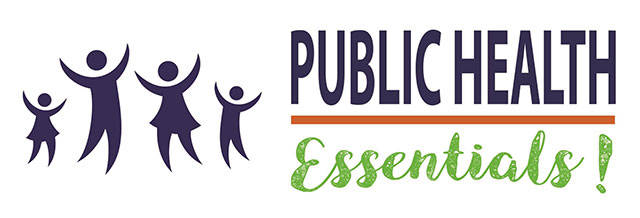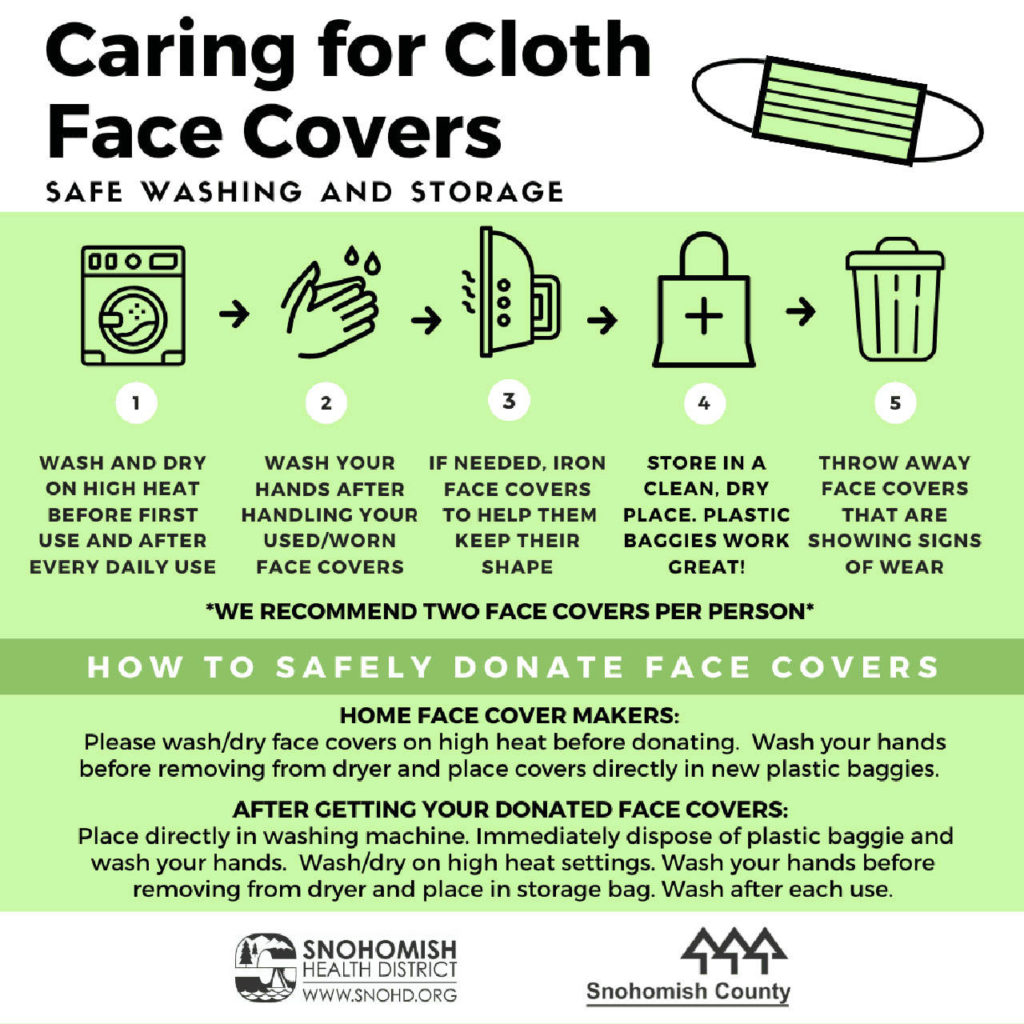By Kari Bray / Snohomish Health District
Wearing a cloth face cover in public areas where it is challenging to keep a six-foot distance from others may help to reduce the spread of the novel coronavirus disease (COVID-19).
Remember that wearing a face cover is not a substitute for social distancing. Continue staying home and away from others unless you are going out for essential work or errands. It’s also important to note that wearing a face cover is more about protecting others around you than it is about protecting yourself.
Cloth face covers are one tool to help slow the spread of this disease, but they are not effective if people don’t use all of the other tools we’ve been emphasizing: handwashing, cleaning and sanitizing high-touch surfaces, avoiding touching your face, staying home except for necessities, and maintaining at least a six-foot distance from others as much as possible.
We also want to emphasize that the face covers recommended for the general public are simple, homemade cloth covers. People should not be using personal protective equipment (PPE) like surgical or N-95 respirator masks. It is crucial that we prioritize the limited supply of PPE for our medical providers, first responders, long-term care facilities, and others whose life-saving work requires them to be in close contact with patients.
How do cloth face covers help?
The recommendation from the Centers for Disease Control and Prevention (CDC) for cloth face covers to be worn by the general public is new. Previous guidance was that only people who were ill should use face covers. However, recent studies indicate that people who are not actively symptomatic can spread the virus. This is why wearing face covers in areas with high rates of community transmission may help – not so much to protect the person wearing the cover, but rather to protect others in case someone has the virus without realizing it. A cloth face cover creates a barrier so the infected person doesn’t spread the virus while talking, or if they sneeze or cough.
In short, when you are in a location where it is difficult to stay more than six feet apart, like grocery stores or food banks, wearing a face cover can help reduce the likelihood that your are spreading the virus to others. For safety reasons, children under the age of 2 should not wear a cloth cover.
If you don’t wash your hands often or if you are fidgeting with your face cover and touching your face more because you are wearing it, the face cover is counter-productive. A cloth cover also does not make it OK to be within six feet of others if you can avoid the contact. Social distancing is still a critical piece of our community’s response to this virus.
Making cloth face covers
For those who have access to cloth covers or the ability to make them and share with others, we want to talk about how to do so safely.
There are a number of patterns and tutorials available for making cloth face covers. We recommend reliable sources like the CDC that have provided general information and design guidance.
The covers can be made from any tightly woven but breathable material, and may be double-layered. The fabric should be washable and should be able to handle high temperatures and hold up for a number of washes.
Face covers should fit over the area from the bridge of the nose to the chin, and from one cheek (past the corner of the mouth) to the other. There should not be gaps when the person moves or speaks.
The CDC has guidance on how to properly make a cloth face cover, including tutorials (with images) of how to do so using several rectangles of cotton fabric, a T-shirt, or a bandana or other square of fabric.
How to safely share face covers in the community
We have seen the generosity and compassion in our community during this pandemic. People who can sew at home have stepped up to make cloth face covers, and many are offering to donate or sell them to others in the community.
It is essential that people who are giving or receiving the covers take steps to prevent spreading COVID-19. While a cloth face cover can be a tool to help reduce the spread of COVID-19, it can also become a vector for spreading the virus if not handled properly.
For people who are making covers: Keep in mind that even if you are feeling OK, there’s a chance that you still may have the virus (some people have mild or no symptoms) or be working with materials or tools that have been in contact with the virus. We want your generosity to help people stay healthy, not make them ill.
• After you finish making cloth face covers, put them in the washing machine and wash with hot water and detergent.
• Wash your hands thoroughly. Transfer the covers from the washer to the dryer. Dry on high heat.
• Once the covers are dry, put on your own face cover and thoroughly wash your hands again – at least 20 seconds of scrubbing all over your hands with soap and warm, running water – before you remove the cloth face covers from the dryer. Place them directly from the dryer into a re-sealable plastic bag or container.
• Seal the bag and do not open it. Deliver the sealed bag to the recipient by mail or doorstep delivery/pick-up.
• We encourage you to only mail or deliver to individuals that you know. Otherwise, please consider donating to a distribution center or donation drop-off location.
For people who are receiving covers
You should receive them in a sealed plastic bag or container, preferably through the mail or doorstep delivery/pick-up. Please use caution when providing your address to others.
• Once you receive the cloth face covers, wash them again. Put them through the washing machine using hot water, or hand wash with hot water if a washing machine isn’t available.
• Wash your hands after handling the face covers.
• Dry the covers on high heat or leave in a warm, dry place until they are no longer damp. You can iron them to help keep their shape.
• When not in use, store cloth face covers in a clean, dry place. A re-sealable bag or container works great.
• Be sure to wash and dry the covers after each use. We recommend having at least two per person so one can be used while the other is being washed.
• Once a cloth face cover is showing signs of wear or is no longer holding shape to securely cover the mouth and nose, throw it away.
Donating cloth face covers
There are a few options for donations.
The first is not for homemade covers, but rather for personal protective equipment that will be distributed to medical providers and first responders. Snohomish County has extended its PPE donation drive through the end of this week at Willis Tucker Park, 6705 Puget Park Dr. in Snohomish. Hours of operations are 10 a.m. to 3 p.m. Monday through Thursday, and 10 a.m. to noon Friday. Accepted donations include new and unused disinfectant wipes, hand sanitizer, medical face shields, medical gloves, N95 masks, surgical gowns, surgical masks and Tyvek suits. Used PPE, handmade masks, non-PPE items, food and cash donations are not being accepted during this drive.
For donations of cloth face covers, many community groups on social media have begun encouraging donations. If you are part of one of these efforts, please follow all of the steps above to make sure you are donating safely.
Snohomish County is working with partners to identify more avenues for donating and distributing cloth face covers, and we hope to have more information on that soon. Please keep an eye out for announcements from Snohomish County government and the Snohomish County Department of Emergency Management, as well as the Health District.
We are grateful to live in a community where generosity shines during the toughest times. We know that donating homemade cloth face covers is one way people are stepping up. We urge you to continue giving, and to do so safely.
The Public Health Essentials! blog highlights the work of the Snohomish Health District and shares health-related information and tips.
Talk to us
> Give us your news tips.
> Send us a letter to the editor.
> More Herald contact information.


























